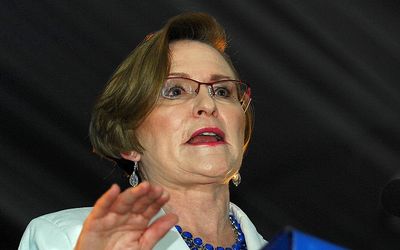WESTERN Cape premier Helen Zille has criticised the move by national government to centralise contracts, saying it was unlawful, not binding, and would not pass constitutional muster.
Ms Zille said making participation in national contracts compulsory was beyond what the Constitution defines as National Treasury’s role.
She also said centralising contracts will not necessarily solve the corruption crisis.
"Some of the most corrupt procurement processes in the history of our democracy have been run through central government. One need think no further than the Arms Deal, for example," Ms Zille wrote in a weekly newsletter.
In a Supply Chain review update released last week, the office of the chief procurement officer stated that it would be compulsory for all departments and governments — national, provincial and local — to participate in large, nationally-procured contracts.
Finance Minister Pravin Gordhan introduced the concept a chief procurement officer in 2012 in his first stint in the portfolio.
In his budget speech last month, Mr Gordhan said that centrally negotiated contracts will be mandatory with effect from April. A new e-Tender portal will also be mandatory, and contracts above R10m will be monitored to ensure value for money and to root out corruption. The minister said the office of the chief procurement officer was mandated to achieve savings of R25bn a year, by 2018-19, out of a government procurement budget of roughly R500bn a year.
In her Newsletter, Ms Zille said a uniform solution is not the answer to widespread corruption and a lack of capacity and political will in many governments.
"While we believe that the minister means well, making participation in national contracts compulsory is unlawful, and beyond what the Constitution defines as National Treasury’s role."
She said the provincial government had in a letter registered its objections with Mr Gordhan’s predecessor, Nhlanhla Nene.
Ms Zille said the Western Cape’s position was that compulsory participation in national contracts exceeds Treasury’s legislative power to determine a framework for procurement by instruction or regulation as per the Public Finance Management Act.
Further, such a move contradicts National Treasury regulation which provides for voluntary participation in transversal contracts; and unlawfully usurps the powers of accounting officers in the relevant provinces, as the chief procurement officer would over-ride their constitutional and legal powers, making decisions on their behalf, said Ms Zille.
She said the Western Cape was not opposed to voluntary participation in national contracts, "where our needs can be met and we can piggyback on economies of scale that make it more cost-effective to do so".
"We have often done so in the past. Under any other conditions, we will choose to do the procurement ourselves. We also have no objection to some other elements of Treasury’s plans — such as an e-Tenders portal, to save on tender advertising costs, and a supplier database, provided that this is used as a due diligence tool to ensure suppliers meet legal standards, is efficiently administered, and does not increase red tape," Ms Zille said.
However, she said the province did not want to be "lumped" with other underperforming governments elsewhere in the country.
"In a situation like ours — where a government has prioritised the building of a capable state; with checks and balances that ensure accountability; and a record that shows respect for the rule of law — we cannot be lumped in with underperforming governments elsewhere.
"If we are, our systems will become less efficient and less cost-effective, not more so… We are confident that National Treasury and Minister Gordhan will appreciate the consequences of proceeding with their unlawful instruction," Ms Zille said.

Helen Zille. Picture: PUXLEY MAKGATHO
WESTERN Cape premier Helen Zille has criticised the move by national government to centralise contracts, saying it was unlawful, not binding, and would not pass constitutional muster.
Ms Zille said making participation in national contracts compulsory was beyond what the Constitution defines as National Treasury’s role.
She also said centralising contracts will not necessarily solve the corruption crisis.
"Some of the most corrupt procurement processes in the history of our democracy have been run through central government. One need think no further than the Arms Deal, for example," Ms Zille wrote in a weekly newsletter.
In a Supply Chain review update released last week, the office of the chief procurement officer stated that it would be compulsory for all departments and governments — national, provincial and local — to participate in large, nationally-procured contracts.
Finance Minister Pravin Gordhan introduced the concept a chief procurement officer in 2012 in his first stint in the portfolio.
In his budget speech last month, Mr Gordhan said that centrally negotiated contracts will be mandatory with effect from April. A new e-Tender portal will also be mandatory, and contracts above R10m will be monitored to ensure value for money and to root out corruption. The minister said the office of the chief procurement officer was mandated to achieve savings of R25bn a year, by 2018-19, out of a government procurement budget of roughly R500bn a year.
In her Newsletter, Ms Zille said a uniform solution is not the answer to widespread corruption and a lack of capacity and political will in many governments.
"While we believe that the minister means well, making participation in national contracts compulsory is unlawful, and beyond what the Constitution defines as National Treasury’s role."
She said the provincial government had in a letter registered its objections with Mr Gordhan’s predecessor, Nhlanhla Nene.
Ms Zille said the Western Cape’s position was that compulsory participation in national contracts exceeds Treasury’s legislative power to determine a framework for procurement by instruction or regulation as per the Public Finance Management Act.
Further, such a move contradicts National Treasury regulation which provides for voluntary participation in transversal contracts; and unlawfully usurps the powers of accounting officers in the relevant provinces, as the chief procurement officer would over-ride their constitutional and legal powers, making decisions on their behalf, said Ms Zille.
She said the Western Cape was not opposed to voluntary participation in national contracts, "where our needs can be met and we can piggyback on economies of scale that make it more cost-effective to do so".
"We have often done so in the past. Under any other conditions, we will choose to do the procurement ourselves. We also have no objection to some other elements of Treasury’s plans — such as an e-Tenders portal, to save on tender advertising costs, and a supplier database, provided that this is used as a due diligence tool to ensure suppliers meet legal standards, is efficiently administered, and does not increase red tape," Ms Zille said.
However, she said the province did not want to be "lumped" with other underperforming governments elsewhere in the country.
"In a situation like ours — where a government has prioritised the building of a capable state; with checks and balances that ensure accountability; and a record that shows respect for the rule of law — we cannot be lumped in with underperforming governments elsewhere.
"If we are, our systems will become less efficient and less cost-effective, not more so… We are confident that National Treasury and Minister Gordhan will appreciate the consequences of proceeding with their unlawful instruction," Ms Zille said.




























Change: 1.19%
Change: 1.36%
Change: 2.19%
Change: 1.49%
Change: -0.77%
Data supplied by Profile Data
Change: -0.19%
Change: 0.69%
Change: 1.19%
Change: 0.00%
Change: 0.44%
Data supplied by Profile Data
Change: 0.62%
Change: 0.61%
Change: 0.23%
Change: 0.52%
Change: 0.12%
Data supplied by Profile Data
Change: -0.21%
Change: -1.22%
Change: -0.69%
Change: -0.51%
Change: 0.07%
Data supplied by Profile Data